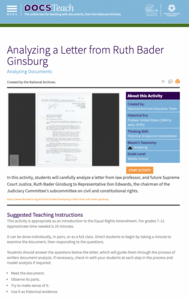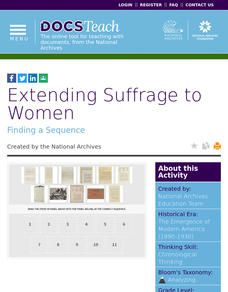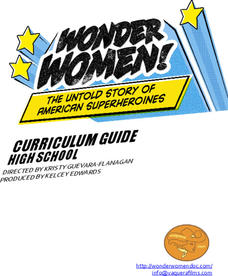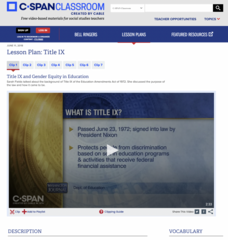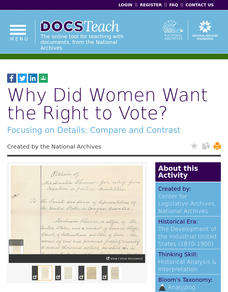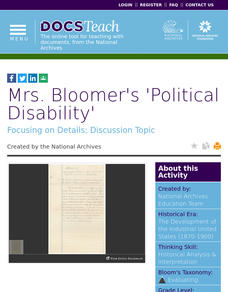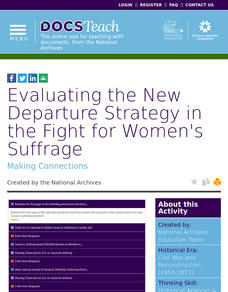Center for History Education
Women's Rights in the American Century
Today, many young people find it hard to understand why it took over 150 years for women in the United States to get the right to vote—why there was even a need for the suffrage movement. As they read a series of primary source...
DocsTeach
Analyzing a Letter from Ruth Bader Ginsburg
Before her career as a Supreme Court Justice, the Notorious RBG was a legal activist for women's rights. Using a letter from then-Professor Ginsburg, young historians carefully examine a letter from Ginsburg to a member of Congress...
DocsTeach
Suffrage Photograph Analysis
Votes for women! Young scholars use images to explore the suffrage movement and its impact on the United States. Historians work in groups or pairs to interpret the photograph, complete a worksheet, and discuss how their opinions of the...
Center for History Education
Speaking Up and Speaking Out: Exploring the Lives of Black Women During the 19th Century
Young historians investigate the often-hidden history of free and enslaved African American women before the Civil War. Using a collection of primary and secondary sources, including speeches, diaries, and poems, they evaluate the often...
Center for History Education
Nineteenth Century Reform Movements: Women's Rights
It's hard to imagine a world where women were marginalized from the seats of power. Yet, there are women today who remember what it was like to not be allowed to vote. Using a DBQ of images and other primary sources, such as political...
Center for History Education
Methods of Reform: The Lowell Mill Girls
Although the girls and women who worked in the Lowell Mills are not often seen this way, they are the forbearers of the American labor movement. Pupils examine primary sources, including testimony about life at Lowell and labor laws, as...
Center for History Education
Native American Gender Roles in Maryland
Toss gender roles out the window—some societies lived in a world where women not only possessed the family wealth but also were the farmers and butchers. Many Native American societies had more gender equity than European societies....
DocsTeach
Extending Suffrage to Women
Votes for women! The activity highlights the push for the Nineteenth Amendment giving women the right to vote. High school scholars learn how the Fifteenth Amendment giving African American men the right to vote helped to spark the...
Vaquera Films
Wonder Women - The Untold Story of American Superheroines: High School Curriculum Guide
A 41-page curriculum guide tells the story of the untold stories of American Superheroines! Divided into three modules, the guide is designed to be used before, during, and after viewing the 2012 documentary Wonder Women! The Untold...
C-SPAN
Landmark Supreme Court Case: Roe v Wade
Perhaps no issue is as controversial than abortion in the American landscape. Go beyond the rhetoric by examining the Supreme Court case that legalized abortion in the United States. A guided note-taking activity unpacks the arguments...
National Woman's History Museum
The Supreme Court and the Lives of American Women 1908-2005
While Roe v. Wade and the passage of the Nineteenth Amendment often get top billing in women's history, other lesser-known laws impact their daily lives. Pupils research cases such as Planned Parenthood v. Casey and use a jigsaw model to...
C-SPAN
Women's Suffrage and the 19th Amendment
The right to vote was hard-won after decades of organizing by women and their allies. Using a series of video clips featuring women's historians, class members consider the efforts behind the Nineteenth Amendment. Possible extension...
C-SPAN
Choice Board - Conversations with Suffragists
Celebrate 100 years of women's suffrage by planning a re-enactment of famous women discussing their fight. After learners view a series of interviews with famous women played by actors, including Susan B. Anthony, Sojourner Truth, and...
National Woman's History Museum
Defying Expectations: Unsung Hero: Marsha P. Johnson and the Stonewall Riots
The 1960s were a turbulent time, but the charismatic figure of Marshal P. Johnson is often left out of the provocative stories of the era. With primary sources that talk about Johnson and her role in the Stonewall Riots, scholars unpack...
National Woman's History Museum
Unsung Voices: Black Women and Their Role in Women's Suffrage
Reclaim perspectives often left out of the narrative about the suffrage movement with an activity that lifts up the voices of African American women. Using primary sources and biographical details of Fannie Barrier Williams' life, young...
National Woman's History Museum
Red Power Prevails : The Activism, Spirit, and Resistance of Native American Women
Native American women powered the American Indian Movement and other social changes, but they are often forgotten by history books. Examining a series of resources, including a documentary film, photographs, secondary sources, and social...
Digital Public Library of America
Ida B. Wells and Anti-Lynching Activism
A packet of 13 primary sources provides young historians with insight into the anti-lynching activism of civil rights Ida B. Wells. Included are images of Wells, her letters, a political cartoon, newspaper lynching announcements, and a...
C-SPAN
Title IX
There's more to Title IX than equality in sports. The federal statute—aimed at preventing gender discrimination—guides how schools handle everything from sports to sexual assault. A series of clips from athletes and schools delves into...
Jane Addams Project
Woman Suffrage
Suffragettes, suffragists, and anti-suffragists. A two-day, richly detailed lesson plan has young historians investigate the twentieth-century suffrage movement. Groups examine primary and secondary source materials about Jane Addams and...
Roy Rosenzweig Center for History and New Media
The Revolutionary Times as Seen Through the Eyes of Women
The role of women before and during the American Revolution changed dramatically. To gain an understanding of these changes, middle schoolers analyze primary source documents, including letters from women that supported the patriot cause...
DocsTeach
Why Did Women Want the Right to Vote?
No taxation without representation may have been the battle cry of the American Revolution, but women used the same argument when demanding their right to vote in the late 1800 and early 1900s. Young historians examine petitions from...
DocsTeach
Suffragist Susan B. Anthony: Petitioning for the Right to Vote
What is the best way to get a point across: a petition or a protest? Using primary sources, including a petition from Susan B. Anthony and a photo of a White House protest from the early 1900s, young historians examine what women did to...
DocsTeach
Mrs. Bloomer's 'Political Disability'
It's hard to believe that women had to argue for the right to vote a mere 100 years ago. Today, young historians can examine their case left behind in primary sources. Using a letter from a woman who claimed she should be able to vote...
DocsTeach
Evaluating the New Departure Strategy in the Fight for Women's Suffrage
When women demanded their right to vote, did the Constitution already protect it? The New Departure Strategy in the women's suffrage movement made this claim through court hearings. Using documents, such as transcripts from Susan B....



